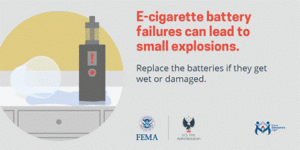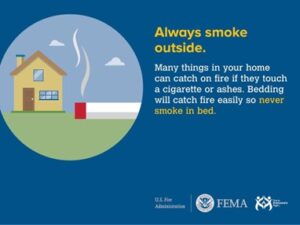Due to some technical difficulties, we’re reposting some old posts.
October 9th – 15th marks Fire Prevention Week. 2022 marks the 100th anniversary of this week. This year’s campaign is “Fires won’t wait. Plan your escape” and aims to educate people about actions that can take to keep themselves and others safe from home fires. Learn more at www.FirePreventionWeek.Org.
We’re taking a break from lung health impacts of cigarettes and vaping. Today, we’re highlighting their impacts on fires. Take a listen to some safety tips from the Spokane Fire Department in Washington. Please note that this video contains material that may be disturbing to some viewers.
Fast Facts1,2,3,4,5
- Heating was the leading cause of residential structure fire in Alaska in 2020
- Smoking materials was the 4th highest heat source
- Nationally, smoking related fires most often originate at
- Exterior balcony or unenclosed porch (18%)
- Bedroom (15%)
- Living room (7%)
- Smoking was the second leading determined case of fire related deaths in Alaska from 2017-2021
- Half of these deaths occurred in multiunit structures
- Fires caused by careless smoking led to about $2,868,040 in damages in Alaska in 2021
- Nationally, e-cigarette explosions have increasingly occurred, causing injury and death. They most often occur:
- While in a person’s pocket
- While it was being used
- While the battery was being charged
Smoke from Fires and Your Health6
- Smoke from fires have fine particles that can penetrate deep into your lungs
- These particles can lead to
- Burning eyes
- Runny nose
- Coughing and wheezing
- Difficulty breathing
- People with heart disease may experience chest pain, palpitations, shortness of breath, or fatigue
- People with lung disease may not be able to breathe as deeply or vigorously as usual, and may experience other symptoms like, coughing, phlegm, chest discomfort, wheezing, and shortness of breath


Tips for Preventing Fires7
Cigarettes
- Don’t start smoking if you currently do not smoke.
- Quit if you do and are ready.
- Smoke outside if not. Many things in your home can catch on fire if they touch something hot.
- Put cigarettes out all the way, every time. Put water on the ashes and butts before putting them in the trash.
- Don’t smoke with after using medicine that makings you tired. Fire spreads faster than many people realize. Being tired may reduce your chances of escaping from a fire.
- Never smoke around medical oxygen, even if the oxygen is turned off. Medical oxygen can explode if a flame or spark is near it. It can still catch on fire when turned off.
- Don’t smoke in bed. Mattresses and bedding can catch fire easily. You may also fall asleep with a lit cigarette.
- Put out cigarettes with an ashtray or a bucket with sand. Make sure they have a wide base so they won’t tip over.
E-Cigarettes
- Don’t start vaping or quit if you currently vape.
- Don’t vape around flammable gasses or liquids, like oxygen, propane, or gasoline
- Charge it on a clean, flat surface. Keep it away from anything that catches fire easily and somewhere you can easily see it.
- Couches and pillows can easily overheat and are spots where it can be accidentally turned on.
- Don’t charge your e-cigarette with a phone or tablet charger.
- Don’t charge it overnight.
- Protect it from extreme temperatures.
- Store loose batteries for your e-cigarette in a case
- Replace batteries if they get damaged or wet
- Only use batteries recommended for your device
- Report any vape battery fire or explosion or other undesired health or quality with a vape to the FDA.


Fire Resources
- Proper Cigarette Disposal: 13-minute video from the Spokane Valley Fire Department on smoking safety and the proper disposal of cigarettes.
- American Red Cross of Alaska: takes you to Alaska’s Home Fire Campaign page. Includes links for home fire safety information as well.
- Fire Prevention Week: information from the National Fire Protection Association
- Wildfire Lung Safety Tips: while we focused more on indoor fires, Alaska does experience wildfires. Check out this page to learn how to plan for wildfires and what to do during one.
- Cigarettes are the most littered item. If they aren’t completely out, they can start a wildfire. (Please don’t litter and make sure cigarettes are completely out before placing them in a proper trash can.)
- Firefighter or Fire Department? Learn more about lung health
Tobacco Resources
- Want to quit tobacco?
- Contact the Alaska State Quitline at 1-800-QUIT-NOW.
- Check out the American Lung Association’s Freedom From Smoking
- Teen and want to quit tobacco?
- Visit NotForMe.Org
- Text VAPEFREE to 873373 or check out Not Buying It | Alaska’s Tobacco Quit Line (alaskaquitline.com)
- Text Quit to 47848 or visit Teen.Smokefree.Gov
- Text “DITCHJUUL” to 88709
- Download the QuitSTART App
- FDA Tobacco Product Safety Reporting Portal: report situations like e-cigarette battery explosion, damaged or defective tobacco products, or product parts, or other undesired healthy or quality concerns.
- You do not need to be the user of a tobacco product to use this portal.
Resident or Property Manger and concerned about smoking at your apartment or condo?
Contact the American Lung Association at SmokefreeHousingAK@Lung.Org to get help with ways to address your concerns.
References
- Civilian Fatal – Fire – Alaska Department of Public Safety
- 2020-Fire-in-Alaska
- ashx (nfpa.org)
- Electronic Cigarette Fires and Explosions in the United States 2009-2016 (fema.gov)
- E-Cigarette-Explosions-and-Fires.pdf (no-smoke.org)
- How Smoke from Fires Can Affect Your Health | US EPA
- Social media toolkit: Smoking fire safety (fema.gov)



